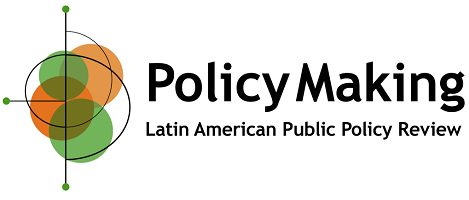
Launch of Policy Making – Latin American Public Policy Review
Launch of Policy Making
Policy Making – Latin American Public Policy Review has been officially launched as an open-access academic journal dedicated to the production and dissemination of scientific knowledge applied to public policy in Latin America. With a multidisciplinary focus and a strong commitment to methodological rigor, the journal aims to bridge theory and practice, publishing research in Public Administration, Political Science, Economics, Law, Sociology, Epidemiology, Urban and Regional Planning, Public Health, and related fields.
The journal adopts an open-access model under a Creative Commons (CC BY) license, uses a double-blind peer review process, and maintains a transparent editorial workflow. There are no submission or publication fees (no APCs), reinforcing its mission to democratize scientific knowledge and broaden the reach of high-quality research relevant to policy design, implementation, and evaluation across the region.
Policy Making operates on a rolling publication system, accepts manuscripts in Portuguese, Spanish, and English, and is organized into four sections:
- Analytics (original scientific articles);
- Expertos (applied analyses, case studies, and experience reports);
- Up-to-Date (notes and reviews of recent bibliographic releases); and
- Utilities (research sources and support materials).
Its scope prioritizes comparative studies and frontier topics in the public sector, with a specific emphasis on the Latin American context.
As part of its commitment to open science and research reproducibility, the journal maintains a Data Repository, where authors may share datasets used in their research, and a Knowledge Base featuring methodological and editorial resources for researchers and practitioners. These initiatives aim to standardize documentation and foster result replication—practices recognized as essential to academic credibility and practical relevance.
The journal’s editorial governance combines academic excellence with practical orientation. The Editorial Team includes Editors André Marenco and Luciana Leite Lima (Federal University of Rio Grande do Sul), Nelson Cardozo and Pablo Bulcourf (Universidad), and Executive Editor Lisandro Abulatif (UFRGS). The Scientific Committee and Associate Editors are currently being formed, reflecting the journal’s planned expansion toward establishing a regional network of reviewers and collaborators.
The first issue (Volume 1) is scheduled for April 2026, following a continuous publication format. Manuscripts aligned with the journal’s scope are already being accepted through the website. Articles accepted and published in advance will be citable in the final version of the issue, expediting the dissemination of peer-reviewed results.
For authors, the Guidelines for Submission detail the originality requirements, section-specific formats, and citation standards (APA style), as well as the two-stage review process — editorial screening followed by double-blind peer review. The document also specifies standards for figures, tables, and source identification, and includes specific directives on the responsible use of generative AI tools (explicit declaration of tools, purposes, and main prompts), in alignment with the journal’s research integrity policy.
Policy Making is promoted by the National Institute of Science and Technology for Quality of Government and Policies for Sustainable Development (INCT/QualiGov), reinforcing the connection between high-quality research and the improvement of public management. With this arrangement, the journal positions itself as a regional hub for applied results and strategic debates on public policy, contributing to the strengthening of state capacities and fostering dialogue between academia, government, and civil society.
Researchers interested in submitting manuscripts or learning more about the journal’s mission, scope, and editorial policies can visit its official website. Policy Making – Latin American Public Policy Review begins its journey with a clear proposition: to become a reference platform for evidence produced in and for Latin America, guided by quality, transparency, and public impact.
Launch of Policy Making
Policy Making – Latin American Public Policy Review has been officially launched as an open-access academic journal dedicated to the production and dissemination of scientific knowledge applied to public policy in Latin America. With a multidisciplinary focus and a strong commitment to methodological rigor, the journal aims to bridge theory and practice, publishing research in Public Administration, Political Science, Economics, Law, Sociology, Epidemiology, Urban and Regional Planning, Public Health, and related fields.
The journal adopts an open-access model under a Creative Commons (CC BY) license, uses a double-blind peer review process, and maintains a transparent editorial workflow. There are no submission or publication fees (no APCs), reinforcing its mission to democratize scientific knowledge and broaden the reach of high-quality research relevant to policy design, implementation, and evaluation across the region.
Policy Making operates on a rolling publication system, accepts manuscripts in Portuguese, Spanish, and English, and is organized into four sections:
- Analytics (original scientific articles);
- Expertos (applied analyses, case studies, and experience reports);
- Up-to-Date (notes and reviews of recent bibliographic releases); and
- Utilities (research sources and support materials).
Its scope prioritizes comparative studies and frontier topics in the public sector, with a specific emphasis on the Latin American context.
As part of its commitment to open science and research reproducibility, the journal maintains a Data Repository, where authors may share datasets used in their research, and a Knowledge Base featuring methodological and editorial resources for researchers and practitioners. These initiatives aim to standardize documentation and foster result replication—practices recognized as essential to academic credibility and practical relevance.
The journal’s editorial governance combines academic excellence with practical orientation. The Editorial Team includes Editors André Marenco and Luciana Leite Lima (Federal University of Rio Grande do Sul), Nelson Cardozo and Pablo Bulcourf (Universidad), and Executive Editor Lisandro Abulatif (UFRGS). The Scientific Committee and Associate Editors are currently being formed, reflecting the journal’s planned expansion toward establishing a regional network of reviewers and collaborators.
The first issue (Volume 1) is scheduled for April 2026, following a continuous publication format. Manuscripts aligned with the journal’s scope are already being accepted through the website. Articles accepted and published in advance will be citable in the final version of the issue, expediting the dissemination of peer-reviewed results.
For authors, the Guidelines for Submission detail the originality requirements, section-specific formats, and citation standards (APA style), as well as the two-stage review process — editorial screening followed by double-blind peer review. The document also specifies standards for figures, tables, and source identification, and includes specific directives on the responsible use of generative AI tools (explicit declaration of tools, purposes, and main prompts), in alignment with the journal’s research integrity policy.
Policy Making is promoted by the National Institute of Science and Technology for Quality of Government and Policies for Sustainable Development (INCT/QualiGov), reinforcing the connection between high-quality research and the improvement of public management. With this arrangement, the journal positions itself as a regional hub for applied results and strategic debates on public policy, contributing to the strengthening of state capacities and fostering dialogue between academia, government, and civil society.
Researchers interested in submitting manuscripts or learning more about the journal’s mission, scope, and editorial policies can visit its official website. Policy Making – Latin American Public Policy Review begins its journey with a clear proposition: to become a reference platform for evidence produced in and for Latin America, guided by quality, transparency, and public impact.


